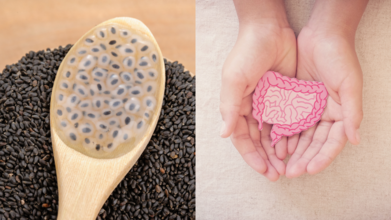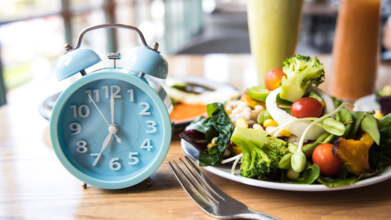- Health Conditions A-Z
- Health & Wellness
- Nutrition
- Fitness
- Health News
- Ayurveda
- Videos
- Medicine A-Z
- Parenting
- Web Stories
Ayurveda Recommends Eating Your Largest Meal At Noon- Know Why

Image Credit: Canva
Imagine feeling revitalized and energetic after eating rather than lethargic and full. What if the secret to improved digestion, enhanced metabolism, and long-term energy levels weren't so much about what you're eating as when you're eating it? Ayurveda, the ancient art of comprehensive healing, would have you believe that the time of day your meals are consumed can be just as important as their nutritional quality. And the golden rule? Eat your largest meal at noon.
Ayurveda's philosophy is based on knowing our body's natural cycles and synchronizing them with nature's cycles. Dr. V.M. Gopal Menon, a renowned Ayurvedic doctor, elucidates that digestion, or Agni or digestive fire, is strongest when the sun is at its highest point in the sky. "Our digestive system is most efficient during midday, so it is the best time to have a nutritious, full meal," he says.
But is modern science backing up this old advice? It is. Studies in circadian biology have found that insulin sensitivity and activity of digestive enzymes peak in the middle of the day, supporting the optimal uptake and processing of nutrients. So if you're wanting to get your gut back on track, want to stay a healthy weight, or just want to feel more in balance, adjusting your mealtime routine may be the easiest yet most potent life modification.
Let's get deeper into the Ayurvedic philosophy behind this practice and see why eating lunch as your largest meal of the day might be the secret to improved health and well-being.
Why you Should Eat Your Largest Meal at Noon
Peak Digestive Fire (Agni) and the Sun's Energy
Ayurveda claims that our Agni is closely related to the position of the sun. As the sun moves towards its peak in the sky, so does our ability to digest. Old books such as Ashtanga Hridayam and Charaka Samhita point out that powerful Agni will help the food digest better, nutrients will be absorbed better, and waste in the metabolic process will be reduced.
Dr. Manisha Mishra Goswami, MD Ayurveda Doctor, says, "When the digestive power is in its most balanced state during the middle of the day, it minimizes chances of bloating, indigestion, and lethargy. The consumption of food filled with proteins, healthy fats, and fibers during this period boosts long-term gastrointestinal health.
Recent research concurs with Ayurvedic knowledge by validating that digestion is regulated by the body's internal clock, or circadian rhythm. Research in The American Journal of Clinical Nutrition reveals that eating the biggest meal earlier during the day improves glucose metabolism and lowers the risk of insulin resistance, obesity, and metabolic syndrome.
"Late-night heavy meals disrupt natural metabolic functions, and the risk of weight gain and poor digestion is higher," says Dr. Goswami. "By having your biggest meal at noon, you let the body work at its best."
Preventing Digestive Disorders
Eating the largest meal in the middle of the day may greatly reduce the risk of general digestive problems including acid reflux, bloating, and slow metabolism. Ayurveda describes why late-night feeding disrupts Pitta (that which digests) and Vata (connected with movement) and causes the imbalances within the gut health.
Dr. Menon explains, "Individuals who consume their final heavy meal at lunchtime and have a light dinner complain less about digestion, sleep well, and have higher energy levels during the day."
Increased Nutrient Absorption and Energy Levels
A balanced midday meal ensures maximum absorption of vital nutrients. When digestion is robust, proteins, fats, and carbohydrates are used optimally for energy and cellular processes. This results in long-lasting energy during the afternoon, avoiding post-lunch slumps.
Many traditional societies have long practiced this habit, where workers and laborers consume their biggest meal during midday, enabling them to work efficiently without drowsiness.
Hormonal Balance and Mental Clarity
Ayurveda instructs that a meal at noon, timed well, not only aids digestion but also enhances brain function and emotional health. Scientific research has demonstrated that even blood sugar levels and a healthy gut directly affect serotonin production, which controls mood and mental clarity.
"Having a healthy meal at lunchtime, full of good fats, protein, and whole grains, aids in maintaining consistent levels of energy, focused concentration, and positive mood throughout the day," says Dr. Goswami.
Ayurveda's Simple Rules for Lunch
To best take advantage of enjoying your biggest meal at lunch, Ayurveda recommends adhering to these simple yet useful rules:
- Digest only when you experience genuine hunger.
- Let your body feel light prior to eating.
- Do not eat if feeling bloated or if experiencing indigestion.
- Take meals in a relaxed, happy atmosphere.
- Select fresh, wholesome foods rather than processed meals.
Both Ayurveda and modern science stress the significance of eating at the right time to sustain maximum health. Having your full meal at lunchtime fortifies digestion, enhances nutrient uptake, stabilizes your energy levels, and avoids lifestyle disorders like obesity, diabetes, and digestive troubles.
Dr. Manisha Mishra Goswami is practising MD Ayurveda Physician, Mumbai in India
Dr. V.M. Gopal Menon is a Ayurvedic physician at Vaidyaratnam Vrindavan Ayurveda Chikitsalayam in India
Harvard Gut Doctor Dispels Basil Seeds Myths You Probably Believed

Credits: Canva
If you have been following trends on social media, you know how much attention basil seeds get, besides, of course, the evergreen chia seeds. Also known as sabja or tukmaria, basil seeds are often mistaken for chia seeds. But do they really live up to the internet hype? A Harvard gut health expert, Dr Saurabh Sethi, has been setting the record straight and some of these myth-busting facts may surprise you.
Are Basil Seeds Gut Friendly?
Basil seeds are absolutely the best when it comes to supporting your gut microbiome. Their high fibre content helps feed the good bacteria in your intestines, which in turn keeps digestion smooth and balanced. If constipation has been your unwanted house guest, soaking a spoonful of these seeds in water and sipping them down could push things back into rhythm.
What About the Weight Loss Hype?
Unlike flashy diet supplements, basil seeds take a more old-fashioned approach: they simply swell up in your stomach after soaking. This expansion creates a natural feeling of fullness, which can help curb those unnecessary snack attacks. Pair them with a balanced diet and you have got yourself a sustainable weight-management tool.
Beware the Bloat
Before you go overboard, there is something you must know. Eating basil seeds dry or in excess can cause bloating and discomfort. They are water-hungry seeds, designed to absorb several times their weight in liquid. So if you skip the soaking step, they might pull water from your gut instead, leaving you puffed up and regretting your health experiment.
Built-In Hydration
Speaking of water, basil seeds act like tiny sponges. Once soaked, they hold on to significant amounts of liquid, which can help your body stay hydrated, especially during hot weather. They are like edible water, refreshing and surprisingly functional.
They Boost Fertility?
Despite what you may have heard in wellness WhatsApp groups, there is no scientific evidence linking basil seeds to improved fertility. The internet loves a miracle cure, but sadly, this is not one of them.
Blood Sugar and Cholesterol Control
If you are keeping an eye on blood sugar, basil seeds might be your quiet ally. Studies suggest that they slow down the absorption of carbohydrates, helping prevent sudden glucose spikes after meals. They may also contribute to lowering cholesterol, making them a handy add-on to heart-friendly diets.
Does it Boost Your Mood?
Wish they worked as antidepressants? Same here. While they are certainly nutritious, current evidence does not support the idea that basil seeds can directly lift depression. Instead, they support your wellness routine rather than taking care of your mental health.
Packed with Nutrients, Not Calories
A tablespoon of basil seeds gives you only about 40–50 calories, making them light on energy but rich in minerals. They are naturally gluten-free and loaded with calcium, magnesium, and iron—all essentials for strong bones and overall vitality. If dairy does not suit you, basil seeds can step in as a small but mighty calcium source.
How Much Should You Actually Eat?
The sweet spot is just 1–2 teaspoons of soaked basil seeds daily. That is enough to reap their benefits without overdoing it. Toss them into lemon water, stir them into smoothies, or sneak them into desserts for a fun texture.
Basil seeds are not a cure-all, but they are far from overrated. They hydrate, support digestion, aid in weight control, and deliver essential minerals. All while being light on calories. Just remember: soak before eating, keep the portions modest, and ignore the wild claims about fertility or instant happiness.
Intermittent Fasting For These Many Hours Could Ruin Your Heart Health

(Credit-Canva)
We know that the kind of food you eat has a big impact on your health, but what about the timing? Scientists are starting to discover that when you eat may be just as important. In the past, people naturally had periods of fasting when food was scarce. Intermittent fasting, or fasting diets, focus on limiting when you eat. While there are potential benefits of it, a new study has revealed it could lead us to have health issues as well.
A new study published in the journal Diabetes and Metabolic Syndrome suggests that following a daily eating window of less than eight hours—a form of intermittent fasting—could double the risk of death from cardiovascular disease. While many people use intermittent fasting for weight loss and other health benefits, this research indicates a potential hidden risk.
How Do Long Fasts Cause Heart Problems?
The study, which analyzed data from over 19,000 U.S. adults, found that those who ate for less than eight hours a day had a 135% higher risk of dying from heart and blood vessel diseases like heart attacks or strokes, compared to people who ate within a 12 to 14-hour window. The researchers, led by senior author Victor Wenze Zhong, found that this link held true across different racial, ethnic, and socioeconomic groups.
The study did not find a link between this eating pattern and a higher risk of death from cancer or other causes. However, Dr. Zhong urged caution, stating that there is currently no long-term evidence from human studies to support using a very short eating window for heart health or longevity.
Can Fasting Harm Our Health?
According to the National Institutes of Health, fasting can potentially harm your health, especially if done for long periods. The article notes that studies have found a higher risk of gallstones in people who fast for more than 16 to 18 hours a day. These individuals are also more likely to need surgery to have their gallbladder removed.
The text also strongly advises that certain people should avoid fasting altogether. This includes individuals with specific health conditions or those taking certain medications. The information emphasizes that more research is needed to fully understand the effects of fasting. It concludes with a warning to talk with a doctor before trying any fasting diet, especially those that are not based on research.
Is Intermittent Fasting Right for You?
While fasting may have health benefits, experts warn that we still have a lot to learn. Some studies have linked fasting for more than 16 hours a day to a higher risk of gallstones. However, many experts agree that a 12-hour eating window followed by a 12-hour fast is likely safe for most people and matches eating patterns seen in people with long lifespans.
If you are considering a fasting diet, it's essential to talk to your doctor first. People with certain health conditions or those on specific medications should not fast. And remember, what you eat still matters—even if you fast, you still need to make healthy food choices.
Not Drinking Enough Water Could Spike Your Stress Hormones, Study Warns

Credits: Canva
When you think of drinking too little water, you can imagine the headaches, drowsiness or the parched mouth signalling dehydration but recent research indicates something much more complicated may be at work in the body, and so to say your mom was right about it- drinking insufficient water could be quietly magnifying stress, paving the way for long-term illnesses.
A research article in the Journal of Applied Physiology found that those consuming less than 1.5 liters of fluid per day had a 50% greater increase in cortisol, the body's main stress hormone, in difficult situations than those who hydrated according to guidelines. The discovery moves the hydration debate away from dehydration exclusively and toward stress resilience—a consideration with far-reaching impacts on cardiovascular, metabolic, and mental well-being.
Cortisol is the stress-fighting hormone that assists the body in responding to stress, but when elevated too long, it creates more problems than it solves. Long-term high cortisol has been linked to heart disease, type 2 diabetes, obesity, depression, anxiety, and compromised immunity.
The researchers at Liverpool John Moores University wanted to know if mild dehydration could affect the way the body responds to pressure. They tested this by grouping healthy young adults into two groups:
Low fluid group: less than 1.5 liters a day
High fluid group: reaching or surpassing recommended standards (2 liters for women, 2.5 liters for men)
Both groups underwent a Trier Social Stress Test that consisted of a simulated job interview followed by quick succession mental math. While both groups were equally anxious and had elevated heart rates, the low-fluid group's cortisol levels jumped astronomically higher, indicating water consumption has a direct impact on stress reactivity.
How Hydration Controls Hormones?
To see why, we have to examine the water-regulation system in the body. When we become dehydrated, the brain causes the release of vasopressin, a hormone that instructs the kidneys to hold on to water. But vasopressin doesn't quit there. It also acts on the hypothalamus, the brain's stress center, triggering further release of cortisol.
This produces a twofold effect: while the body is preserving water to avoid dehydration, it also increases stress responses. For an individual with work deadline pressures, family responsibilities, or money worries, this increased stress reactivity might compound into long-term health issues.
A Real-World Experiment in Stress and Hydration
The trial model replicated daily stressors. Participants received only 10 minutes' preparation time before confronting interviewers in white coats in front of mock cameras, after which they received stern math problems. Saliva samples taken at baseline and after showed sharp contrasts: those who consumed less water on a consistent basis had darker urine, worse markers of hydration, and much stronger cortisol responses.
What is surprising is that the members of the low-fluid group didn't actually perceive themselves as thirstier than others. That means that even if they didn't have apparent dehydration symptoms, their bodies were still being stressed—a hidden vulnerability many of us may be missing.
The health effects reach beyond transient nerves. Chronically elevated cortisol can slowly increase blood pressure, interfere with blood sugar control, and weaken immunity. It might even lead to premature aging and lower stress resistance later on.
Indeed, it was recently reported by the British Heart Foundation that there was a disturbing increase in cardiovascular deaths among UK working-age adults—a trend predicted partly to be caused by stress and lifestyle. If stress hormone regulation is as much affected by hydration as these results indicate, it is possible that something as mundane as water consumption could be a factor in reversing this path.
How Much Water Is Enough?
Varying slightly from country to country, public health advice recommends:
Women: about 2 liters per day
Men: about 2.5 liters per day
This includes all fluids—water, tea, coffee, milk, and water-rich foods. Still, actual needs vary based on climate, physical activity, and health status. Pregnant and breastfeeding women, for example, often require more.
The easiest way to monitor hydration? Check urine color. Pale yellow typically indicates good hydration, while darker shades mean it’s time to drink more.
How To Use Hydration as a Stress-Management Tool?
We already understand that sleep, exercise, and diet define stress resilience. Hydration now has its place on that list. Drinking more water won't eliminate the pressures of life, but it can dull the body's physiological overreaction to them.
As Dr. Daniel Kashi, a study author, put it, "Though the low-fluid group did not say they felt thirstier, low hydration was obviously linked with higher cortisol reactivity. Over time, that hyper-responsiveness could add up to poor health in the long run."
The scientists are now investigating if increased water consumption in under-hydrated persons can decrease daily stress reactions—such as traffic jams, presentations, or impending deadlines.
Chronic stress has been termed a contemporary public health crisis, spurring everything from cardiovascular disease to mental illness. Most strategies for reducing stress such as meditation, therapy, or life redesign—take considerable time, expense, or infrastructure. Hydration, in contrast, is universal and within reach.
That does not translate to water being a panacea. The research was done under laboratory conditions and only with young, healthy adults. There is a need for more research to validate whether sufficient water can help alleviate stress-related medical issues in a wide range of populations and over many decades. Nevertheless, the potential for a low-cost, daily routine to alleviate stress is worthy of consideration.
With stress seeming inevitable in today's world, giving the body every possible advantage matters. Good health is seldom the result of a single sensational intervention but of constant, daily habits. Having a water bottle handy may be one of the smallest, most practical, and most powerful first steps toward resilience.
© 2024 Bennett, Coleman & Company Limited

